Key takeaways:
- Docker simplifies application deployment and enhances team collaboration by providing consistent environments across different setups.
- Best practices include keeping Docker images lightweight, using Docker Compose for multi-container applications, and maintaining clear version control of Dockerfiles.
- Challenges include network configuration, managing persistent data with Docker volumes, and addressing compatibility issues before deployment.
- The future of Docker is promising with the rise of microservices and integration with orchestration tools like Kubernetes, fostering greater efficiency and innovative development practices.
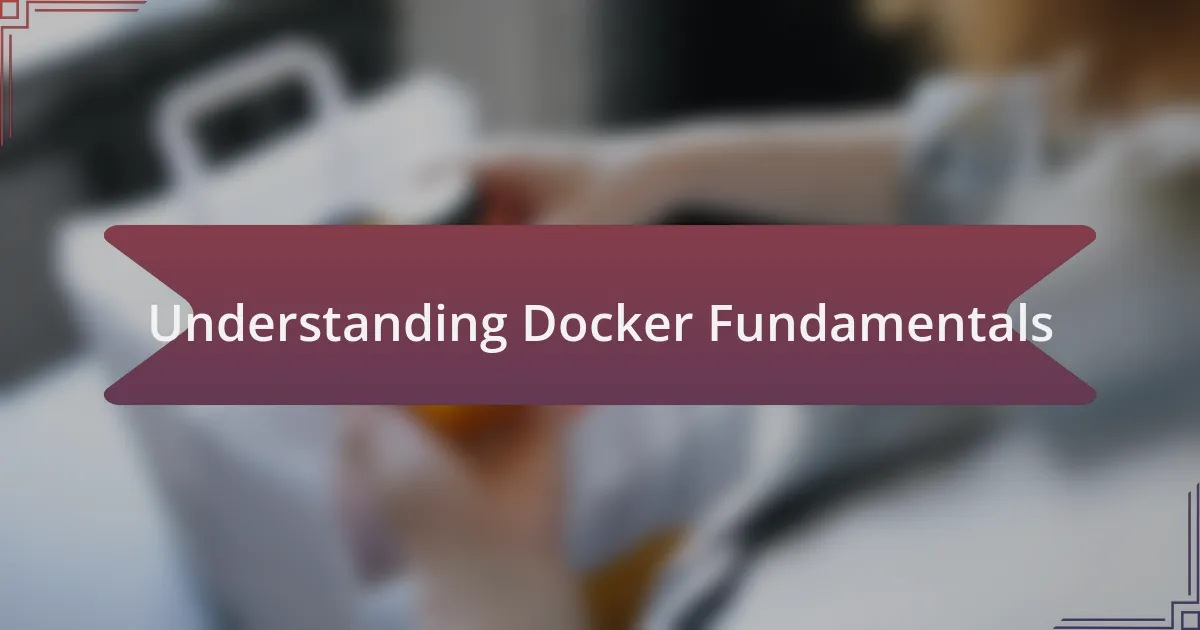
Understanding Docker Fundamentals
Understanding Docker fundamentals is essential for anyone stepping into the world of containerization. I still remember the first time I pulled a Docker image; the excitement of isolating an application environment brought a level of simplicity I hadn’t experienced before. Isn’t it fascinating how Docker allows you to package applications and their dependencies into containers, which can run seamlessly across different environments?
At its core, Docker eliminates the notorious “it works on my machine” issue. I faced this challenge countless times in past projects, where inconsistent development environments led to frustrating debugging sessions. When I started using Docker, I realized that it not only streamlines the development process but also enhances team collaboration. Have you ever felt the relief of working in a consistent environment that everyone on your team can replicate?
Moreover, Docker’s layered file system is a game changer. Each change you make creates a new layer, making it easy to track changes and roll back if something goes wrong. This functionality reminds me of those times I wished I could undo a few steps in my coding, and now, with Docker, that possibility is right at my fingertips. Embracing these fundamentals opens up a new realm of efficiency and agility in software development.
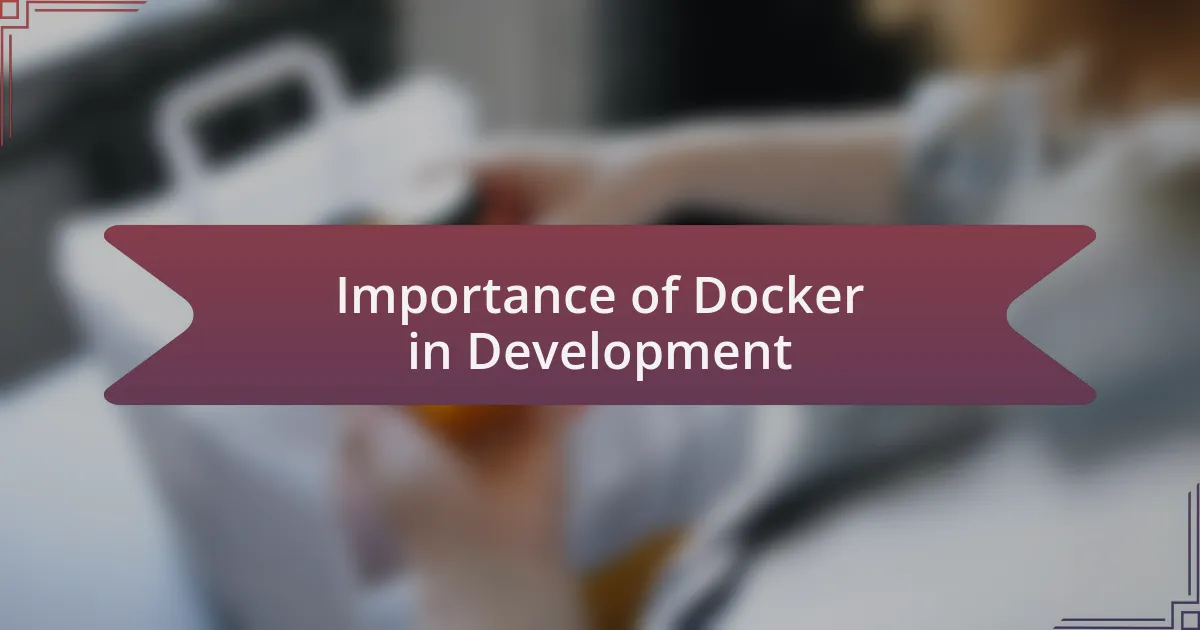
Importance of Docker in Development
Docker has become indispensable in modern development due to its ability to simplify the deployment process. I recall a particularly complex project where coordinating setups between team members felt like herding cats. Once we integrated Docker, the ease of sharing identical environments made our collaboration feel almost effortless. Can you imagine transforming a chaotic setup into a unified process overnight?
Another significant aspect of Docker is its efficiency in resource management. I remember running multiple applications that would often compete for system resources, leading to slowdowns and frustrating bottlenecks. Docker’s ability to comfortably run several containers simultaneously without the overhead associated with virtual machines was a revelation. How much of your time could you save if your apps ran without those pesky performance issues?
Lastly, the portability offered by Docker is simply transformative. I’ve worked with various cloud platforms, and the hassle of migrating applications often felt like climbing a steep hill. With Docker, I found myself effortlessly moving containers between environments, knowing they would run the same, regardless of where they were deployed. Isn’t it empowering to have such flexibility at your fingertips?

Best Practices for Using Docker
When using Docker, one of the best practices I’ve learned is to keep images lightweight. Initially, I made the mistake of packing unnecessary tools and libraries into my images, which resulted in slow builds and sluggish deployments. However, by focusing on only what’s essential, I reduced build times significantly. Have you ever noticed how much smoother your projects run when they aren’t bogged down by superfluous elements?
Another critical aspect is the use of Docker Compose for multi-container applications. I vividly remember feeling overwhelmed trying to manage various components of an application all at once. Once I embraced Docker Compose, the clarity it provided was invaluable. Suddenly, orchestrating everything from databases to application servers felt cohesively manageable. Why add unnecessary complexity to your workflow when Docker provides a streamlined way to tackle it?
Furthermore, establishing clear version control for your Dockerfiles can save you a lot of headaches. I learned this the hard way when a minor change caused a cascade of unexpected issues. By adopting a disciplined approach to versioning, I found it easier to track changes and roll back if needed. It’s surprising how little effort this takes compared to the peace of mind it brings—what’s your strategy for keeping your builds consistent and reliable?
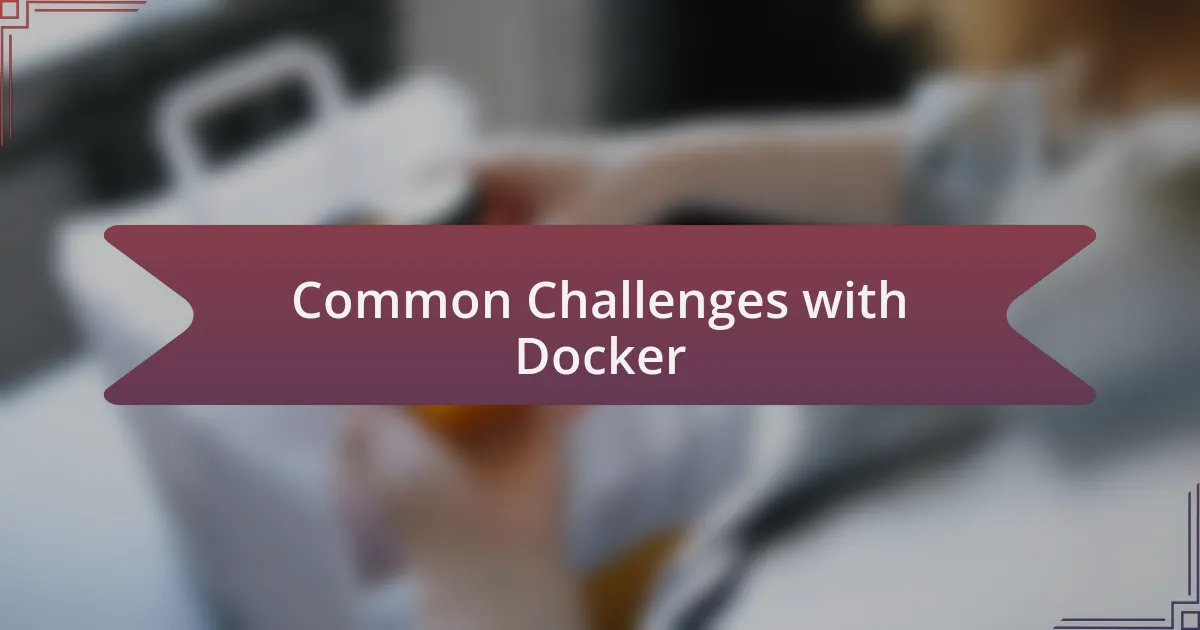
Common Challenges with Docker
When working with Docker, one common challenge I faced was network configuration. I remember spending hours troubleshooting connectivity issues between containers, wondering if I had overlooked setting a simple flag. It’s astounding how something like a misconfigured network can derail an entire project. Have you ever experienced a similar frustration, trying to piece together what went wrong?
Another hurdle is managing persistent data, especially when containers are ephemeral by nature. I learned this lesson the hard way when critical data vanished after a container restart. It taught me the importance of leveraging Docker volumes for data persistence. Have you tried using them in your projects? You might be surprised at how much smoother your workflow can become when your data is secure.
Lastly, compatibility issues can pop up unexpectedly, particularly when working across different environments. I vividly recall an incident where an application ran flawlessly on my machine but faltered in production. This inconsistency was a real wake-up call, leading me to recognize the value of thorough testing before deployment. Have you found ways to mitigate these discrepancies in your experience? It’s a constant challenge that requires vigilance and adaptability.
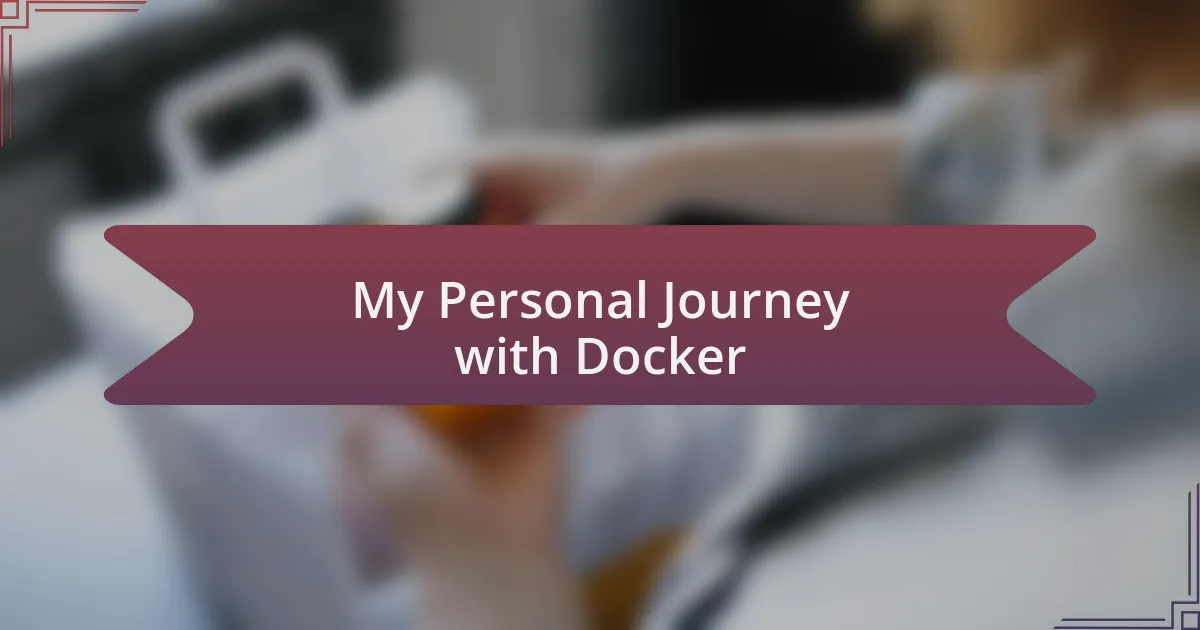
My Personal Journey with Docker
My first encounter with Docker marked a turning point in my approach to software development. I remember the thrill of effortlessly spinning up containers and witnessing my applications run in isolation. It felt like magic at first; it’s almost hard to believe how transformative a tool can be for simplifying environments. Have you ever felt that rush when you discover a new technology that just clicks?
As I delved deeper into Docker, I faced my share of growing pains. I vividly recall a late-night debugging session when I accidentally deleted an essential Dockerfile, leading to a complete loss of my setup. The frustration was overwhelming, but it pushed me to improve my version control practices and embrace a more disciplined approach to my projects. Isn’t it fascinating how setbacks can lead to better habits and ultimately strengthen our skills?
I also found the Docker community to be an unexpected source of support. I remember joining forums and attending meetups where developers shared their Docker stories and workflows. It was inspiring to see how varied the use cases were. Has community interaction enriched your journey in tech as well? For me, these exchanges helped demystify some of the complexities I faced, turning challenges into shared experiences.

Lessons Learned from Docker Development
Lessons Learned from Docker Development
One of the biggest lessons I learned was the importance of properly structuring Dockerfiles. In the beginning, I remember how chaotic my Dockerfiles became, packed with unnecessary layers. It took some trial and error to realize that a well-organized Dockerfile not only speeds up builds but also makes troubleshooting more manageable. Have you ever written something and then felt the weight of its complexity? Reducing that complexity has truly streamlined my development process.
Another experience that stood out was related to container orchestration. I initially underestimated the power of using tools like Docker Compose in managing multi-container applications. I once tried to run a complex application stack manually, and it was a nightmare. When I finally embraced Compose, it felt liberating. How can simplicity be so powerful? I learned that leveraging orchestration tools can save time and reduce headaches, allowing me to focus on writing quality code instead.
Moreover, security is a critical aspect that I couldn’t overlook during my journey with Docker. Early on, I was so focused on getting my applications up and running that I neglected to scan my images for vulnerabilities. I recall a moment of panic when I discovered a security flaw in a base image I had used for a project. It was a sobering reminder that security should always be a priority. Have you experienced something similar in your development practices? This experience taught me to incorporate security checks into my workflow from the beginning, reinforcing the notion that it’s always better to be proactive rather than reactive.
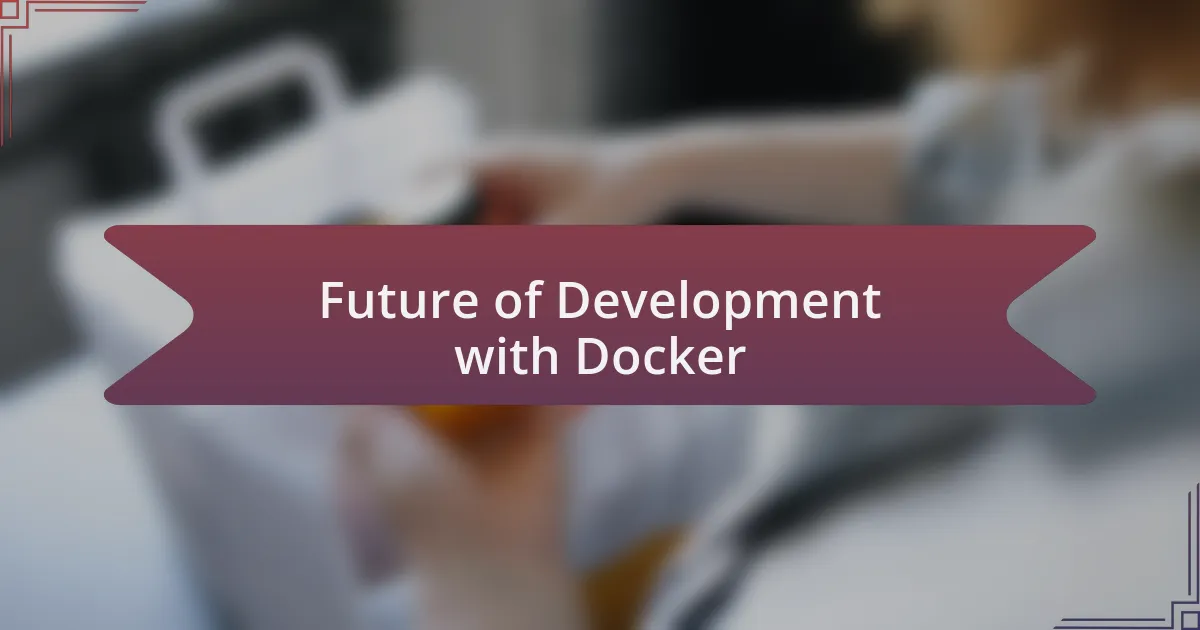
Future of Development with Docker
As I look ahead, the future of development with Docker feels immensely promising. With the rise of microservices architecture, I foresee Docker playing an even larger role in how we build and deploy applications. I remember when I first transitioned to microservices; it was like flipping a switch in my brain. Suddenly, it was clear how much easier it was to isolate issues in independent containers rather than wrestling with a monolithic codebase. Does that make you think about how you could streamline your projects?
Additionally, the integration of Docker with emerging technologies such as Kubernetes is likely to redefine how we manage and scale applications. I had a moment of sheer enlightenment when I first deployed a Docker container within a Kubernetes cluster. The capabilities for automatic scaling blew me away. I often wonder, how much more efficient could our workflows become as these technologies evolve together? Embracing these advancements will not only enhance productivity but also encourage smarter resource management.
It’s also worth considering how Docker’s community-driven nature will shape future best practices. I’ve gained so much from the vibrant discussions and shared experiences on forums and GitHub. Engaging with others has often sparked new ideas for using Docker in innovative ways. Have you thought about the potential impact of collaborating with a global community? It excites me to think that as Docker continues to grow, the collective wisdom and creativity of its users will propel us into an era of unprecedented development possibilities.